25
Sep
EXPIRED: 50% off MailStore Archiver when Moving to MDaemon from Exchange 2003
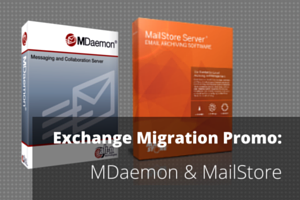 In a recent blog post I talked about how MailStore can help manage and speed up the unenviable task of migrating all of your historic Exchange 2003 email to MDaemon Messaging Server.
The point at which you're moving email platform is ideal to be introducing an archiving solution like MailStore. Primarily because it will aid with the migration process itself, but also because it will manage your mailbox sizes on an ongoing basis too.
With this in mind, we're offering a very healthy 50% off new MailStore licences to Exchange 2003 owners who are purchasing a new MDaemon licence of any size.
In a recent blog post I talked about how MailStore can help manage and speed up the unenviable task of migrating all of your historic Exchange 2003 email to MDaemon Messaging Server.
The point at which you're moving email platform is ideal to be introducing an archiving solution like MailStore. Primarily because it will aid with the migration process itself, but also because it will manage your mailbox sizes on an ongoing basis too.
With this in mind, we're offering a very healthy 50% off new MailStore licences to Exchange 2003 owners who are purchasing a new MDaemon licence of any size.


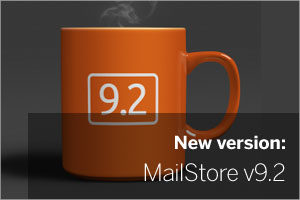 Today sees the latest point release in the roadmap of German developer MailStore, and in addition to a long list of fixes there are a couple of interesting new developments which have caught our collective Zen Software eye.
Version 9.2's 'juicy bits' that I'll talk a little more about in this post include:
Today sees the latest point release in the roadmap of German developer MailStore, and in addition to a long list of fixes there are a couple of interesting new developments which have caught our collective Zen Software eye.
Version 9.2's 'juicy bits' that I'll talk a little more about in this post include:
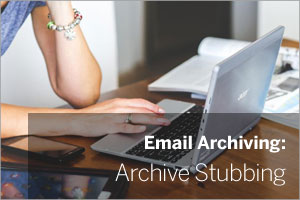 If you're struggling to manage your mailbox sizes, or just need to keep email for long periods for compliance reasons, you may well have found yourself looking around for an archiving solution of some kind.
There are plenty out there, with many sharing some similarities, however it's the technical approach of the various products that's a good method for distinguishing them.
Some of the vendors you'll come across will employ the use of a technology known as 'stubbing'. As MailStore Server doesn't, in this post I'll take a brief look at what it is, and why it's German developers have decided against stubbing and instead chosen an alternative route.
If you're struggling to manage your mailbox sizes, or just need to keep email for long periods for compliance reasons, you may well have found yourself looking around for an archiving solution of some kind.
There are plenty out there, with many sharing some similarities, however it's the technical approach of the various products that's a good method for distinguishing them.
Some of the vendors you'll come across will employ the use of a technology known as 'stubbing'. As MailStore Server doesn't, in this post I'll take a brief look at what it is, and why it's German developers have decided against stubbing and instead chosen an alternative route.
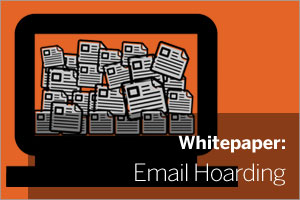 Keeping more email than is actually needed is a habit that most people fall in to at some stage. But make no mistake, it is a problem. And it's not one to be ignored.
Keeping more email than is actually needed is a habit that most people fall in to at some stage. But make no mistake, it is a problem. And it's not one to be ignored.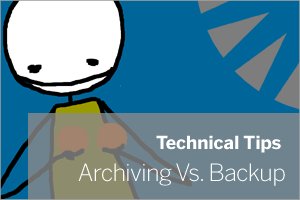 If you're already backing up your email as part of a standard routine, you could be forgiven for thinking that adding archiving to the mix would needlessly be doubling up.
I should mention at this point, if you're not doing anything at all, then you really need to be rectifying that situation rather than reading our blog (as nice as it is to have you).
If you're already backing up your email as part of a standard routine, you could be forgiven for thinking that adding archiving to the mix would needlessly be doubling up.
I should mention at this point, if you're not doing anything at all, then you really need to be rectifying that situation rather than reading our blog (as nice as it is to have you).
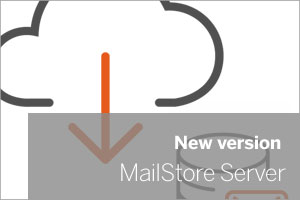 We've just made the latest version of MailStore live on our site and if you, or perhaps your customers, are users of Google Apps, it's one I highly recommend you download.
The ability to archive Google mail isn't completely new to MailStore, however in previous versions, each mailbox would need to be archived individually, requiring a separate archiving 'job' and manual entry (and ongoing maintenance) of username and password credentials.
In version 9.1, the German developer have now made the whole process a breeze.
We've just made the latest version of MailStore live on our site and if you, or perhaps your customers, are users of Google Apps, it's one I highly recommend you download.
The ability to archive Google mail isn't completely new to MailStore, however in previous versions, each mailbox would need to be archived individually, requiring a separate archiving 'job' and manual entry (and ongoing maintenance) of username and password credentials.
In version 9.1, the German developer have now made the whole process a breeze.
 If you've recently made the move to MailStore version 9, it's entirely possible you'll be sat there wondering why on earth all of those archiving jobs you had set up can't be modified any more.
If you've recently made the move to MailStore version 9, it's entirely possible you'll be sat there wondering why on earth all of those archiving jobs you had set up can't be modified any more.
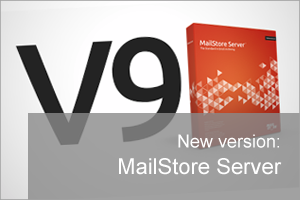 The launch of the latest and greatest version of MailStore Server was announced today by the German vendor.
Version 9 boasts a long list of fantastic improvements for both end users and administrators alike - our pick of the bunch include the following...
The launch of the latest and greatest version of MailStore Server was announced today by the German vendor.
Version 9 boasts a long list of fantastic improvements for both end users and administrators alike - our pick of the bunch include the following...
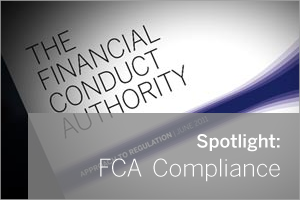 The
The  Something I get asked for by MailStore customers on a regular basis is an easy way for one user to search for messages within another's archive.
One approach to this would simply be to log into the MailStore client as an Administrator, which would give you full rights over all the user archives but this is only really useful for one-off access - there is a much more elegant way to tackle this...
Something I get asked for by MailStore customers on a regular basis is an easy way for one user to search for messages within another's archive.
One approach to this would simply be to log into the MailStore client as an Administrator, which would give you full rights over all the user archives but this is only really useful for one-off access - there is a much more elegant way to tackle this...